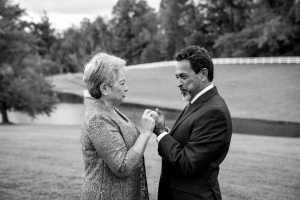If you have ever dealt with someone who displays passive-aggressive behavior, he or she can leave you feeling confused and angry. You may feel the person is being underhanded with behind-the-scenes moves or back-handed compliments.
Do you do this to other people? For example, has your significant other accused you of passive-aggressive behaviors such as silent treatment or ignoring his or her calls? Passive aggressiveness stems from underlying anger and an inability to express this anger.
What is passive-aggressive behavior?
What happens when you bury anger deep inside? It manifests itself in other behaviors, including passive aggressiveness. These behaviors might begin during childhood if you grew up in a household where it was frowned upon to express anger, whether you were punished for talking back or anger was considered impolite.
A person who is painfully uncomfortable in confrontational situations will avoid them at all costs. Instead, he or she may lash out by engaging in passive-aggressive behaviors and “getting back” at the other person.
Examples of passive-aggressive behaviors include:
- Saying you are fine but crossing your arms and turning away from the person when your words and body language do not match.
- Doing underhanded things to sabotage someone else’s efforts. For example, agreeing to work on a project and presentation but not coming through at the last minute or arriving late on purpose.
- Refusing to speak and instead employing silent treatment. Someone with passive-aggressive behaviors may refuse to answer your call if he or she feels slighted. He or she may only give you nonverbal cues like sighing and eye-rolling.
- Although procrastination can be a bad habit, it is also passive-aggressive behavior. When you procrastinate, you often make others wait on you to do something, leave the house, or arrive at a destination. It is another form of control.
Passive-aggressive behaviors can also signify a mental disorder like anxiety, depression, and substance abuse. A licensed mental health care provider can help you get to the root of the behavior.
How to stop passive-aggressive behavior.
Whether you or a loved one display passive-aggressive behaviors, you must address the problems of not expressing anger constructively. These behaviors can cause issues with your relationship. In addition, children watching their parents engage in these behaviors will pick these habits up and use them in the future.
If you are aware of your behavior, you can stop. Changing the behavior patterns may take practice, but you can learn to recognize the thoughts and emotions and decide to react differently. Agoura Christian Counseling can help guide you through this process, offering support as you work to create healthier responses and reactions in your life.
Read below for tips on how to stop passive-aggressive behavior.
Recognize the signs.
Have you ever noticed the thoughts that bombard your mind when you are angry? The ideas that you have before you decide how to react? It is these thoughts that you need to catch. But first, you must realize that feeling anger is natural and normal. Everyone does. However, how you react determines whether your behavior is productive in resolving the conflict.
Familiarize yourself with the signs of passive-aggressive behavior to identify when a loved one is using them on you. You want to be able to stop the behavior. Your loved one may not be aware that he or she is reacting this way as he or she may have grown up in a household where this was how one parent would express their displeasure. Be patient, but be ready to stand up for yourself firmly.
Ask yourself why.
 Once you catch your thoughts, ask yourself why. Why are you angry? Did this person really slight you, or is this a perceived slight? Would it serve you better to confront the person? Why are you afraid of direct confrontation?
Once you catch your thoughts, ask yourself why. Why are you angry? Did this person really slight you, or is this a perceived slight? Would it serve you better to confront the person? Why are you afraid of direct confrontation?
These are legitimate questions. If you are afraid of confrontation, is it because you think the person will harm or embarrass you somehow? Why do you think you resort to these behaviors? A Christian counselor can help you understand the why behind your actions.
When the behavior is from a loved one, recognize that there is something else at play. For example, he or she is feeling anger or resentment over something. You may want to try directly asking him or her. It might be an emotionally painful discussion, but continuing with passive aggressiveness will not serve the relationship.
Be direct and assertive.
There is a difference between being direct and assertive and being rude. Unfortunately, many of us grew up believing these were the same. We were taught to be empathetic and never harsh. This belief wars against us when we feel anger. How do we express our anger without offending the other person or causing him or her pain?
Being direct and calmly speaking is a behavior to practice. It is informing the other person that when he or she behaves in such a way, it affects you. For example, your husband may seem miffed because you forgot to pick up his favorite box of cookies from the store. Still, instead of saying something to you and accepting your apology, he “forgets” to get gas for the lawnmower – a chore you have wanted him to take care of for two weeks.
In this mild example, you could approach your spouse and apologize again for forgetting the cookies. But then add, “I know you were disappointed that I forgot your favorite cookies at the store.
But, when you intentionally do things like ‘forget’ the gasoline for the lawnmower, I feel that you are doing it out of spite, and it hurts me. We can understand that we each have things on our minds, and it is easy to make mistakes. Why don’t we go right now to the store for the cookies and pick gasoline up for the mower?”
With this approach, you have calmly addressed the situation. You have acknowledged your husband’s disappointment, informed him how this behavior made you feel, and given your husband an opportunity to help you rectify it.
Work off your anger.
 That underlying anger needs a healthy outlet. You need something to burn off that aggression. Instead of turning to alcohol, substance abuse, or other vices, consider throwing that aggression into a more physical endeavor.
That underlying anger needs a healthy outlet. You need something to burn off that aggression. Instead of turning to alcohol, substance abuse, or other vices, consider throwing that aggression into a more physical endeavor.
Exercise is an excellent way to work out your frustrations and hurt. If you are healthy and have your physician’s approval, you can throw yourself into cardio workouts, running, circuit training, lifting weights, kickboxing, or other activities. Even brisk walking can burn some negative energy off and dissipate the emotion.
Although slower in movement, yoga, and tai chi can help you catch your breath and release some of the anger you are bottling inside. The flows quiet your mind but keep you focused on the breath and movements.
Take note of what works and when you need help.
As your behavioral patterns change, you will grow in self-confidence. Confrontation will be less scary. The more you realize that you can diffuse a situation by being assertive yet calm, the less anger will have a hold on you.
Anger is an emotion everyone feels, but how you handle yourself determines your mental health. You may believe you are “getting back” at someone who hurt you with these behaviors. But, you are pushing others away and putting yourself at risk for anxiety and depression.
If you try these suggestions and are still passive-aggressively lashing out at others, you may want to reach out for help from a therapist. Knowing better and doing better is not always a smooth transition without professional help.
Finding help.
Feel free to contact me or another Christian counselor at Agoura Christian Counseling today if you or a loved one displays passive-aggressive behavior. Your counselor can help you get to the root of the underlying anger or why you feel inhibited from showing your anger toward others. He or she can also teach you anger management and conflict resolution strategies.
Learning to be assertive and direct does not mean you are no longer kind. You are standing up for yourself and voicing your opinion productively. Give our office a call today to get started.
“Concerned”, Courtesy of Thom Milkovic, Unsplash.com, CC0 License; “Tropical Shore”, Courtesy of Mathilde Langevin, Unsplash.com, CC0 License; “Loving Couple”, Courtesy of Rick Shaw, Unsplash.com, CC0 License; “Hearts”, courtesy of Marsha Reid, Unsplash.com, CC0 License
-
Shirley Kauffman: Author
As a Licensed Marriage and Family Therapist, I provide faith-based counseling for individuals, couples, and families facing a wide range of issues including anxiety, depression, marriage problems, divorce, and other family issues. With God’s help, I’...
-
Kate Motaung: Curator
Kate Motaung is the Senior Writer, Editor, and Content Manager for a multi-state company. She is the author of several books including Letters to Grief, 101 Prayers for Comfort in Difficult Times, and A Place to Land: A Story of Longing and Belonging...
DISCLAIMER: THIS ARTICLE DOES NOT PROVIDE MEDICAL ADVICE
Articles are intended for informational purposes only and do not constitute medical advice; the content is not intended to be a substitute for professional medical advice, diagnosis, or treatment. All opinions expressed by authors and quoted sources are their own and do not necessarily reflect the opinions of the editors, publishers or editorial boards of Stone Oak Christian Counseling. This website does not recommend or endorse any specific tests, physicians, products, procedures, opinions, or other information that may be mentioned on the Site. Reliance on any information provided by this website is solely at your own risk.








